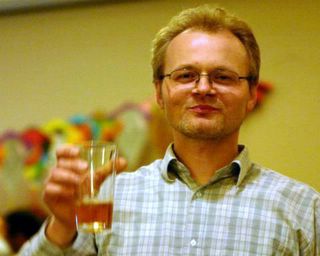WUI (Writing under the influence)
 Somebody once said we are all Americans, sometimes born in the wrong places.
Somebody once said we are all Americans, sometimes born in the wrong places.On a warm autumn day in 1986, while enjoying beer with my college buddies,
I decided to join my new homeland.
I've come to appreciate the ideals that helped create this great country.
Liberalism, political-correctness, multiculturalism and moral equivalence
are destroying it.
This old house Grovenet Wal*Mart Visiting Poland American wine better than French.
Monday, September 18, 2006
Why liberals will always complain and why they will always be wrong
[...]Here's a small sample of the many ways in which ordinary Americans today are Bill-Gates-like rich compared to almost all humans who've ever lived:
* None of us has ever starved to death
* We have indoor plumbing and artificial light
* We bathe regularly
* We have solid roofs over our heads, rather than bug-and-vermin-infested thatched roofs
* We routinely converse in real time to people one mile or one thousand miles away
* We don't get smallpox
* Our life expectancy is decades longer
And while it's possible to list some ways in which the average person today is worse off than were pre-industrial folk -- for example, no one before the 20th century died in airplane crashes -- only the most doctrinaire ascetic would deny that almost everyone today in the Western World is vastly better off than were the overwhelming bulk of the human population before the industrial revolution.
Among the best of these studies is one produced annually by economists James Gwartney and Robert Lawson, and published jointly by the Cato Institute and Canada's Fraser Institute. The 2006 study will be released this week. Among the most important findings of Economic Freedom of the World: 2006 Annual Report are these:It's clear to me that the only reason why liberals complain about economical state of the middle class is to gain more power. The problem is that liberals offer more prosperity for less economic freedom which is an oxymoron.
Nations in the top fourth in economic freedom have an average per-capita GDP of US$24,402, compared to US$2,998 for those nations in the bottom fourth
The top fourth of economic freedom also has an average per-capita economic growth rate of 2.1 percent, compared to 0.2 percent for the bottom fourth
Unemployment in the top fourth of economic freedom averages 5.9 percent, compared to 12.7 percent in the bottom fourth
Life expectancy averages 77.8 years in nations in the top fourth of economic freedom but a mere 55.0 years in the bottom fourth
Nations in the top fourth of economic freedom have only 0.3 percent of children in the work force, while nations in the bottom forth suffer 19.3 percent of their children in the labor force
In the top fourth, the average income of the poorest 10 percent of the population is US$6,519 compared to US$826 for those in the bottom fourth
As this careful new study makes clear, there is no denying that more freedom means more prosperity for more people -- and that lack of freedom ensures poverty for the masses, regardless of the degree of technological sophistication.
Archives
October 2004 November 2004 December 2004 January 2005 February 2005 March 2005 April 2005 May 2005 June 2005 July 2005 August 2005 September 2005 October 2005 November 2005 December 2005 January 2006 February 2006 March 2006 April 2006 May 2006 June 2006 July 2006 August 2006 September 2006 October 2006 November 2006 December 2006 January 2007 February 2007 March 2007 April 2007 May 2007 June 2007 July 2007 August 2007 September 2007 October 2007 November 2007 December 2007 January 2008 February 2008 March 2008 April 2008 May 2008 June 2008 July 2008 August 2008 September 2008 October 2008 November 2008 December 2008 January 2009 February 2009 March 2009 April 2009 May 2009 June 2009 July 2009 August 2009 September 2009 October 2009 November 2009 December 2009 January 2010 February 2010 March 2010 April 2010 May 2010 June 2010 July 2010 August 2010 September 2010 October 2010 November 2010 December 2010 January 2011 February 2011 March 2011 April 2011 May 2011 June 2011 July 2011 August 2011 September 2011 October 2011 December 2011 January 2012 February 2012 March 2012 April 2012 May 2012 June 2012 August 2012 September 2012 October 2012 November 2012 January 2013 February 2013 March 2013 May 2013 July 2013 September 2013 October 2013 November 2013 December 2013 January 2014 March 2014 April 2014 May 2014 June 2014 July 2014 August 2014 September 2014 October 2014 November 2014 December 2014 May 2015 September 2015 November 2015 December 2015 March 2016